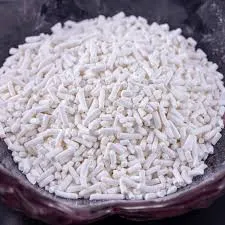
preservatives used in bakery products
Preservatives Used in Bakery Products
Baked goods hold a cherished place in our diets around the world, from the soft, fluffy loaves of bread to the delicate pastries and cakes that adorn our celebrations. However, the perishability of these delicious items poses a significant challenge for both manufacturers and consumers alike. To ensure longevity and maintain quality, the baking industry often relies on preservatives. This article delves into the types, functions, and implications of preservatives used in bakery products, aiming to provide insights into their importance and the ongoing discussions surrounding their use.
What Are Preservatives?
Preservatives are substances added to food products to prevent spoilage caused by microbial growth and to enhance shelf life. In bakery products, preservatives play a vital role in maintaining freshness, texture, and flavor over extended periods, allowing products to withstand the rigors of transportation, storage, and retail display.
Common Types of Preservatives
1. Chemical Preservatives These are synthetic compounds commonly used in the baking industry. Some widely used examples include
- Calcium Propionate Often added to bread, this compound inhibits mold and bacterial growth. It is highly effective and does not alter the taste or texture of the bread significantly.
- Sodium Benzoate This preservative is used in sweet baked goods, where it helps prevent yeast spoilage and maintains the quality of the final product.
- Potassium Sorbate Known for its ability to inhibit the growth of molds and yeasts, potassium sorbate is frequently used in cakes and pastries.
- Vinegar and Citrus Juices The acetic acid in vinegar has preservative properties and can enhance the flavor profile of baked goods.
- Honey Due to its sugar content and antimicrobial properties, honey acts as a natural preservative while also adding sweetness.
preservatives used in bakery products

- Essential Oils Certain essential oils, like rosemary and thyme, possess antioxidant and antimicrobial properties, making them effective natural preservatives.
Functions of Preservatives in Bakery Products
Preservatives serve several essential functions in bakery products, including
- Extending Shelf Life By preventing spoilage and microbial growth, preservatives help to ensure that baked goods remain fresh for longer periods, reducing food waste.
- Maintaining Quality Preservatives help preserve the texture, flavor, and overall quality of baked goods, which is crucial for commercial success.
- Safety By inhibiting harmful microorganisms, preservatives contribute to food safety, protecting consumers from potential foodborne illnesses.
Controversies and Consumer Perceptions
Despite their benefits, preservatives, particularly synthetic ones, have drawn scrutiny from health-conscious consumers. There is an ongoing debate regarding the long-term health effects of consuming foods with chemical preservatives. Some studies suggest a potential link between certain preservatives and health issues, leading to increased calls for transparency in food labeling.
As a response to consumer demands, many bakers are reformulating their products to reduce or eliminate synthetic preservatives, opting instead for natural alternatives. This shift reflects a broader trend towards clean labels and increased awareness of ingredient sourcing among consumers.
Conclusion
Preservatives play a crucial role in the bakery industry, ensuring that products remain safe, fresh, and enjoyable for consumers. While the use of synthetic preservatives may raise health concerns, the industry is trending towards natural alternatives, aligning with consumer preferences for healthier ingredients. As we embrace the world of baked goods, understanding the role of preservatives enables us to make informed choices about the products we consume, balancing quality, safety, and health considerations in our diets.
-
Buy High-Quality Trichloroisocyanuric Acid for Sale | TCCA 90% SupplierNewsAug.30,2025
-
Pure Sodium Dichloroisocyanurate Dihydrate | Powerful DisinfectantNewsAug.29,2025
-
Industrial Chemicals: Quality & Purity for Every IndustryNewsAug.28,2025
-
Nitrile Rubber Honoring Strict Production StandardsNewsAug.22,2025
-
Aspartame Ingredients Honoring Food Safety ValuesNewsAug.22,2025
-
Fertilizer for Balanced Plant NutritionNewsAug.22,2025
-
Cyanide Gold Processing with High Purity AdditivesNewsAug.22,2025
Hebei Tenger Chemical Technology Co., Ltd. focuses on the chemical industry and is committed to the export service of chemical raw materials.
-

view more DiethanolisopropanolamineIn the ever-growing field of chemical solutions, diethanolisopropanolamine (DEIPA) stands out as a versatile and important compound. Due to its unique chemical structure and properties, DEIPA is of interest to various industries including construction, personal care, and agriculture. -

view more TriisopropanolamineTriisopropanolamine (TIPA) alkanol amine substance, is a kind of alcohol amine compound with amino and alcohol hydroxyl, and because of its molecules contains both amino and hydroxyl. -

view more Tetramethyl Thiuram DisulfideTetramethyl thiuram disulfide, also known as TMTD, is a white to light-yellow powder with a distinct sulfur-like odor. It is soluble in organic solvents such as benzene, acetone, and ethyl acetate, making it highly versatile for use in different formulations. TMTD is known for its excellent vulcanization acceleration properties, which makes it a key ingredient in the production of rubber products. Additionally, it acts as an effective fungicide and bactericide, making it valuable in agricultural applications. Its high purity and stability ensure consistent performance, making it a preferred choice for manufacturers across various industries.





